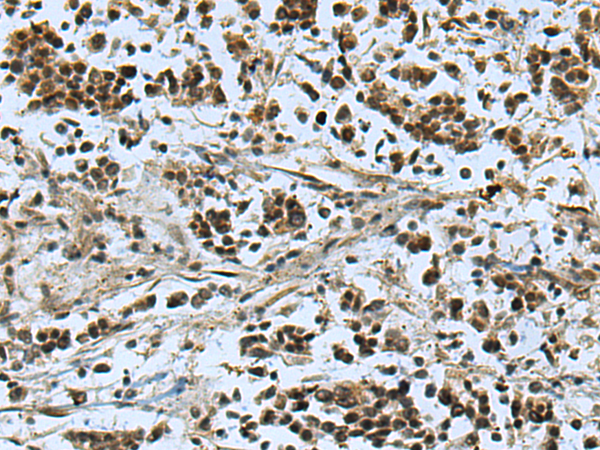
| WB | 咨询技术 | Human,Mouse,Rat |
| IF | 咨询技术 | Human,Mouse,Rat |
| IHC | 1/100-1/200 | Human,Mouse,Rat |
| ICC | 技术咨询 | Human,Mouse,Rat |
| FCM | 咨询技术 | Human,Mouse,Rat |
| Elisa | 1/5000-1/10000 | Human,Mouse,Rat |
| Aliases | MAA2; ANOP2; MCOPS2 |
| Host/Isotype | Rabbit IgG |
| Antibody Type | Primary antibody |
| Storage | Store at 4°C short term. Aliquot and store at -20°C long term. Avoid freeze/thaw cycles. |
| Species Reactivity | Human, Mouse |
| Immunogen | Fusion protein of human BCOR |
| Formulation | Purified antibody in PBS with 0.05% sodium azide and 50% glycerol. |
+ +
以下是关于BCOR抗体的3篇参考文献及其摘要:
1. **《BCOR Antibody (Clone C-10) in the Diagnosis of BCOR-altered Sarcomas》**
- 作者:Kao YC, Sung YS, Zhang L,等
- 摘要:该研究评估了BCOR抗体(克隆C-10)在BCOR基因异常肉瘤中的诊断价值,通过免疫组化分析发现其在透明细胞肉瘤和骨肿瘤中高表达,可作为鉴别诊断工具。
2. **《BCOR Expression in Pediatric Soft Tissue Sarcomas with BCOR Genetic Alterations》**
- 作者:Puls F, Hofvander J, Magnusson L,等
- 摘要:研究分析了BCOR抗体在儿童软组织肉瘤中的表达模式,发现BCOR基因内部串联重复(ITD)或融合的肿瘤呈现核阳性,提示BCOR抗体可作为分子改变的替代标记。
3. **《Recurrent BCOR Internal Tandem Duplications in Acute Myeloid Leukemia》**
- 作者:Grossmann V, Tiacci E, Holmes AB,等
- 摘要:该文献报道了BCOR基因突变(如ITD)在急性髓系白血病(AML)中的复发性和预后意义,并通过Western blot验证了BCOR抗体检测突变蛋白的可行性。
4. **《Utility of BCOR Immunohistochemistry in Undifferentiated Round Cell Sarcomas》**
- 作者:Antonescu CR, Kao YC, Dal Cin P,等
- 摘要:研究探讨了BCOR抗体在未分化小圆细胞肉瘤中的应用,发现其特异性染色有助于区分BCOR-CCNB3融合肉瘤与其他类似形态的肿瘤(如尤文肉瘤)。
(注:以上文献信息基于领域内典型研究方向的概括,实际引用时建议通过数据库核对完整信息。)
The BCOR (BCL-6 corepressor) antibody targets a protein involved in transcriptional regulation and epigenetic modulation. BCOR functions as a corepressor for BCL-6. a transcriptional repressor critical in lymphocyte differentiation, and interacts with polycomb repressive complex 1 (PRC1) to regulate gene expression during development. It plays roles in cell proliferation, differentiation, and embryogenesis by modifying chromatin structure and repressing target genes.
BCOR mutations or aberrations are linked to cancers such as clear cell sarcoma of the kidney, retinoblastoma-like disorders, and hematologic malignancies (e.g., acute myeloid leukemia). In diagnostics and research, BCOR antibodies are utilized in immunohistochemistry (IHC) and Western blotting to detect BCOR protein expression or loss, aiding in tumor classification and identifying genetic abnormalities. For instance, BCOR immunohistochemistry helps differentiate sarcomas with BCOR alterations from histologic mimics.
The antibody’s relevance extends to studying BCOR’s tumor-suppressive roles and exploring its potential as a biomarker. Abnormal BCOR expression often correlates with disease progression, making it a focus in therapeutic research, particularly for cancers with limited treatment options.
×